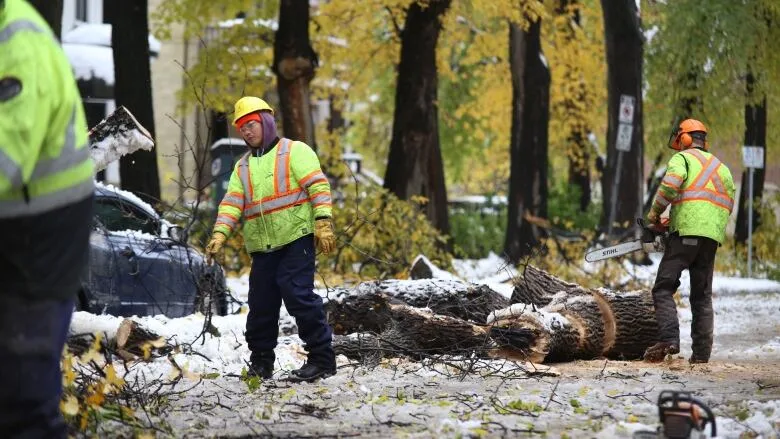
Why Winnipeg's tree canopy might be better off after snowstorm's drubbing
The wounds suffered by Winnipeg's urban forest from the snowstorm earlier this month may be visible for years, but experts say the city's trademark trees can recover — and become stronger for it.
Calgary has learned this lesson in the five years since a devastating weather event infamously called "Snowtember, which crippled nearly half a million of the city's public and private trees.
But now, that city's outdoor ceiling has returned to its former glory, says Todd Reichardt, urban forestry manager at the City of Calgary, who spent a few days in Winnipeg guiding the the city's response to our unprecedented storm.
"I would say very much, unequivocally, our canopy has recovered," said Reichardt.
Proof of the resiliency of Calgary's tree canopy is that it withstood another, potential Snowtember this year, Reichardt said.
Once again, some 25 cm of snow was forecast. Once again, wet, heavy snow clung to trees weighted with leaves.
But before the snowfall, a memo was sent to Calgary's mayor and council to assure them the city's trees would stand tall.
"We are confident after the money that you've invested and the work that we have done … our forest is going to sustain and has the capacity to absorb all this wet snow," Reichardt said, recalling what the memo conveyed.
CALGARY CAME OUT UNSCATHED
True to that forecast, "we came out unscathed," he said.
Case in point: Calgary received around 20 service requests on 311 due to storm-related issues; back in 2014's Snowtember, it got 27,000 calls.
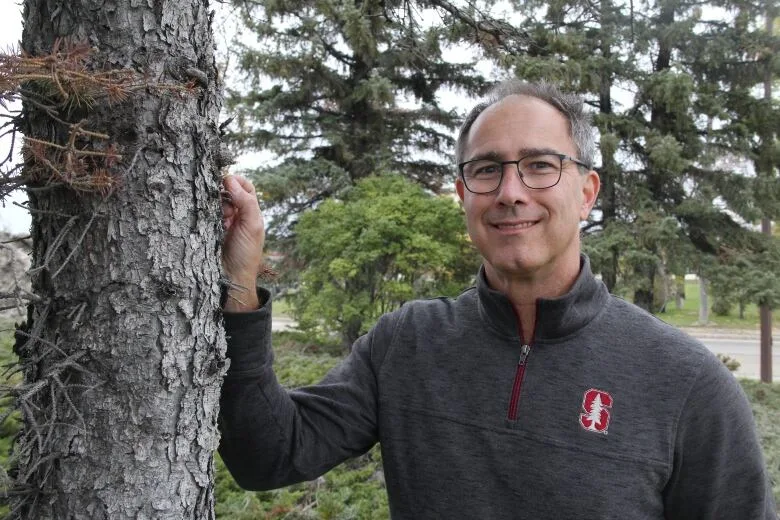
Todd Reichardt, urban forestry manager at the City of Calgary, says an urban canopy damaged by an early snowstorm can recover in a number of years with a significant pruning and replanting effort. (Ian Froese/CBC)
Calgary saw the results of the $35.5 million it invested over a three-year period to restore and replant their canopy.
"Did we spend it properly? When I see all of that, I went, 'Yeah,'" he said. "I see the payoff for Calgarians and future Calgarians, and I know my friends here in Winnipeg are trying to do the same thing."
Winnipeg officials estimate it will cost tens of millions of dollars to clean up the debris after heavy snow pummelled trees, power lines and, for some, knocked out their electricity for days. The slow-moving storm blasted southern Manitoba beginning Oct. 10, and into the next day.
With early fall trees still covered in leaves — and above-freezing conditions — the moisture-laden snow accumulated in the canopy, weighing heavily on limbs and branches, until they came crashing down.
It's estimated some 30,000 city-owned trees were affected by the storm that brought 15-25 cm of snow on the city. Tens of thousands more private trees have been damaged on private property.
The storm caused so much damage it may be up to three weeks before the city can start focusing on removing tree debris from public property — and an entire year to tidy up — city forester Martha Barwinsky cautioned last week.
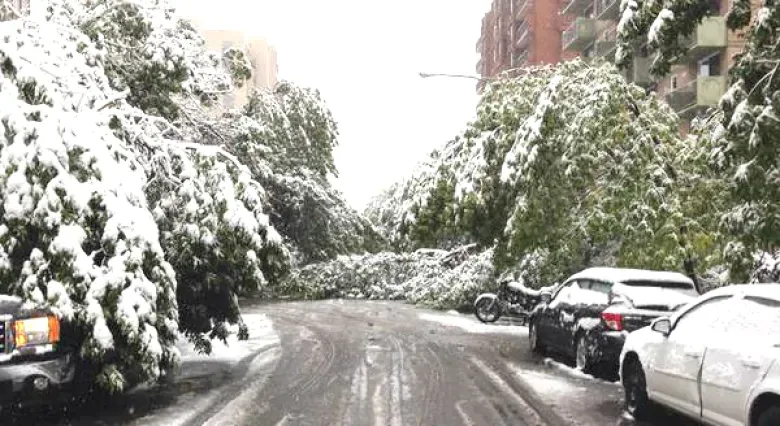
A street in Calgary covered in snow-laden trees after a late-summer snowstorm in 2014, better known as 'Snowtember.' (@lyndengill/Twitter)
It hasn't been determined how Winnipeg will respond to the freak snowstorm, or whether it will follow Calgary's lead with a multi-year recovery and restoration effort. Barwinsky said it would take about five years to replant.
But the city knew it needed the help of its neighbours once it declared a state of emergency.
PAYING IT FORWARD
Calgary was more than willing to offer its crews, aerial trucks and chippers to Winnipeg.
"When we were in our hour of need, other municipalities like Edmonton, Red Deer, Lethbridge, they came and helped us out," said Reichardt, who grew up in Winnipeg.
"We know how it is. We know how scary it can be. We're here to help them out."
Reichardt had several meetings in Winnipeg to share some of the lessons his own city learned.
He said Calgary realized its emergency response could not be dictated by the overwhelming number of 311 calls they received, but instead was triaged to tackle places where dangerous branches and limbs were still hanging.
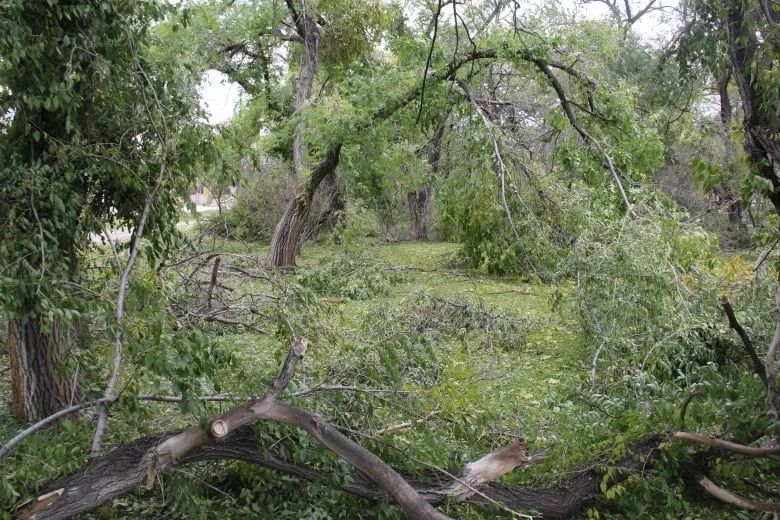
Debris from fallen trees and shrubs is strewn across Coronation Park in Winnipeg, a week after the snowstorm. (Ian Froese/CBC)
The city reformed how it did pruning by moving from a street-by-street approach to targeting the trees of greatest need. The database they use has been enhanced to reflect this information.
A significant portion of the $35.5 million investment was spent on preventive pruning. Julie Guimond, Calgary's urban forestry lead, said any shrubs or tree branches vulnerable to the next wicked storm were slashed.
"What we found was it was very worth it, that we had huge support from our citizens," she said on the phone from Calgary.
"Our Snowtember event has really galvanized Calgary's love of our urban forest, that they value having that canopy for ... the health and for the environmental benefits that it gives to the city."
To the trained eye, the remnants of Snowtember are etched into a lopsided tree here, or a beloved tree no longer there, said Codie Anderson, a Calgary arborist.
He reasoned that Winnipeg's tree stock will be prepared for the next storm.
"Once all of this settles out and the things that have already been damaged are gone, by and large, an urban canopy is in better shape," he said.
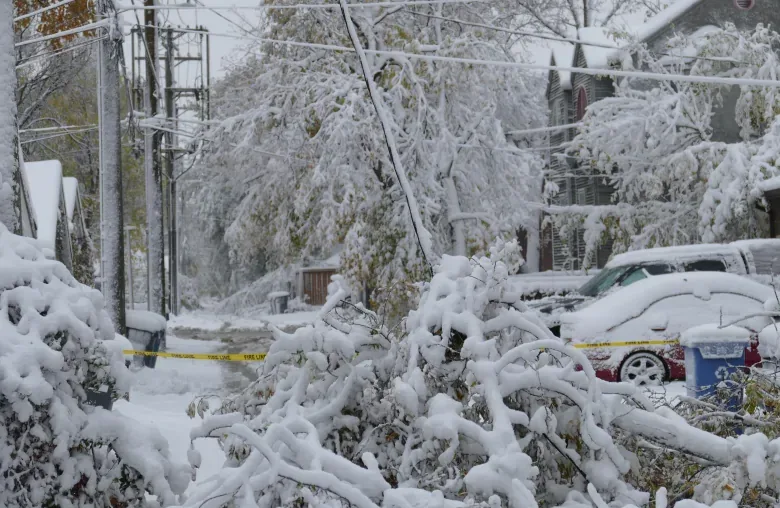
Trees took down power lines, landed on vehicles and wrecked vehicles in Winnipeg during the unprecedented early-October snowstorm. (Jeff Stapleton/CBC)
While trees are Gerry Engel's passion, the Trees Winnipeg president isn't too devastated by the damage locally. The defected trees and limbs are revealing themselves, and now something stronger will grow in its place.
"It's not apocalyptic, I've heard that phrase used. I mean, I don't see it that way," he said.
"Things will rebound. We'll get great reaction growth next year, there's going to be light getting into places where there wasn't light before."
This article was originally published on CBC by Ian Froese










